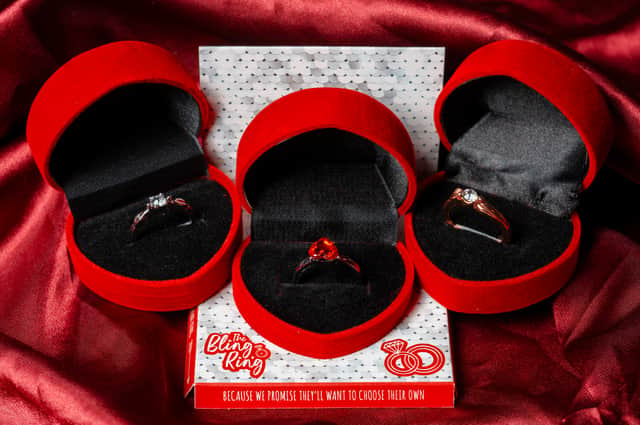Poundland has sold 40,000 engagement rings before Valentine’s Day - would you say “yes” to one?


Poundland has sold more than 40,000 £1 engagement rings ahead of Valentine’s Day.
That figure is more than double the number sold by the discount retailer before 14 February in 2019.
Advertisement
Hide AdAdvertisement
Hide AdThe rings are meant to stand in as a placeholder while couples save up to buy more permanent wedding bands.
Poundland told the BBC that its 2020 Valentine's range features more than 80 products, ranging from fragrances to "adults only" gift cards.
“Man Bands”
Poundland’s rings come in two types, “Man Bands” a simple faux silver band, presented in a blue velvet box, and “Bling Rings”, which have fake diamonds set into them.
The rings come in four styles and four separate finger sizes.
The Man Band is being marketed as a "placeholder" with which women can pop the question on 29 February, when tradition dictates that women can reverse roles and propose to their male partners.
The tongue-in-cheek Man Band packaging also encourages potential suitors to "Take the leap and do the asking… Because he might never get around to it!"
The Man Band was marketed in the wake of Poundland's wildly popular 2019 'Bling Rings'.
Also marketed as engagement rings, more than 20,000 Bling Rings were sold to eager customers last year.
Advertisement
Hide AdAdvertisement
Hide AdWhy are women encouraged to propose on 29 February?
Leap year proposals are an Irish tradition dating back to the 5th century, when an Irish nun called St Bridget supposedly complained to St Patrick that women were waiting too long for their suitors to propose.
As a result, St Patrick struck a deal with the nun, decreeing that on 29 February, which only takes place once every four years, women would be allowed to propose.
Various other traditions have attached themselves to leap year proposals over the years, including one that stipulates that men have to pay a fine if they refuse a leap year proposal.
Across the world, this fine has been paid in the form of money, a new gown or gloves for the rejected suitor.
Valentine’s Day spending
Spending on Valentine’s Day related gifts and meals reached more than £850m in 2019, according to researchers at Savvy.
A rise of almost 8 per cent on 2018 spending, 14 February is a crucial source of revenue for retailers.
Companies like M&S have capitalised on the Valentine’s boom by promoting tongue-in-cheek products like their “Love Sausage” and “Love Cucumbers” during February.